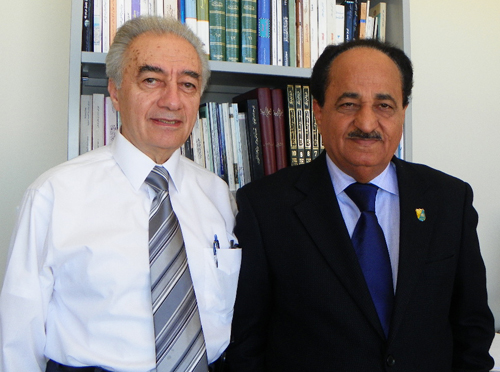Dean at University of Kuwait Taking Information about M.A.T. Back Home
The dean of the College of Education at the University of Kuwait, a college with more than 5,000 undergraduates, spent about two weeks in Arkansas recently to learn about the graduate education programs offered at the University of Arkansas.
Abdul Rahman Al-Ahmed, who earned his doctoral degree from Michigan State University, said he was particularly interested in the Master of Arts in Teaching program offered by the College of Education and Health Professions. Tom Smith, dean of the college, and Mounir Farah, professor of secondary and international education, sent Al-Ahmed an invitation last fall as part of an informal effort to build bridges between the two colleges, Farah said. Farah has advised several students who earned undergraduate degrees from the University of Kuwait and then came to Fayetteville for advanced degrees, and the university has pending applications from others.
Al-Ahmed had a number of productive meetings while he was in Fayetteville, including talks with G. David Gearhart, chancellor of the university; Tom Smith, dean of the College of Education and Health Professions; Michael Daugherty, head of the department of curriculum and instruction, and other administrators in the College of Education and Health Professions; Rita Littrell, director of the Bessie B. Moore Center for Economic Education in the Sam M. Walton College of Business; representatives of the graduate school and the King Fahd Center for Middle East and Islamic Studies; and faculty members in secondary education and other programs on campus. Al-Ahmed also visited an elementary school in Springdale that partners with the college to place student interns.
"I heard a lot of good things about the University of Arkansas," Al-Ahmed said. "This encouraged me to come here, and I have learned a lot and met many distinguished faculty."
The graduate programs in education at the University of Kuwait are much smaller than the undergraduate population, he explained, with an enrollment of about 300 students.
"I wanted to learn more about the teacher-preparation program here, especially on the graduate level," he said. "We are planning to have a master's degree like your M.A.T. in a few years. This would be a master's degree for students without an education background, students who have bachelor's degrees in the sciences and arts."
Kuwait is interested in modeling the program after the college's M.A.T. because of its extensive nature, Farah said. The Master of Arts in Teaching is a one-year, full-time program in which students serve internships in local schools while completing courses for the graduate degree. It has received national recognition in the past.
"Our program is not just a road to a teaching certificate," Farah continued. "We also include research and educational theory."
Adding the new program will require the University of Kuwait to reallocate faculty responsibilities and workloads, Al-Ahmed said.
"Right now, we have a different kind of master's degree," he said. "It is a classic Master of Education degree."
Farah and others at the University of Arkansas learned from Al-Ahmed, too, Farah said, in particular about managing such large numbers of students.
Al-Ahmed is serving his third appointment as dean of the College of Education at the University of Kuwait. He has seen many changes during that time, including a shift in faculty makeup. The faculty has moved from being about 75 percent non-Kuwaiti to about 95 percent Kuwaiti, he said. The college meets with representatives of the Ministry of Education regularly to ensure that students are entering programs for which they will be able to find jobs after graduation, he said.
"We want to be sure we are meeting the needs of the markets," Al-Ahmed said.
Contacts
Heidi Wells, director of communications
College of Education and Health Professions
479-575-3138, heidisw@uark.edu
